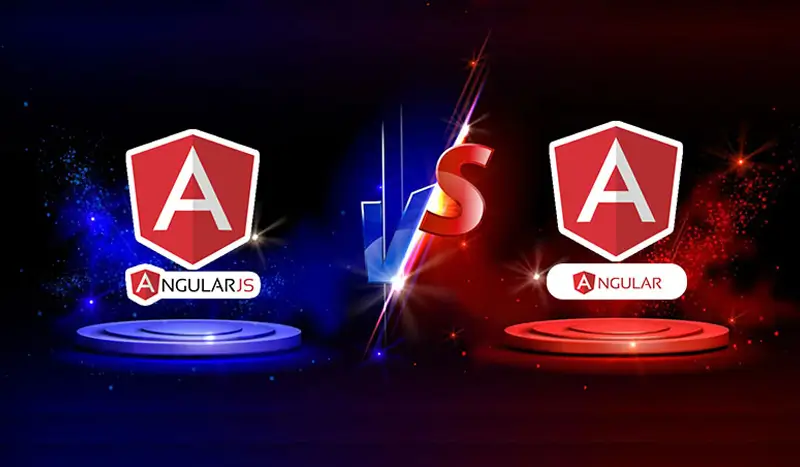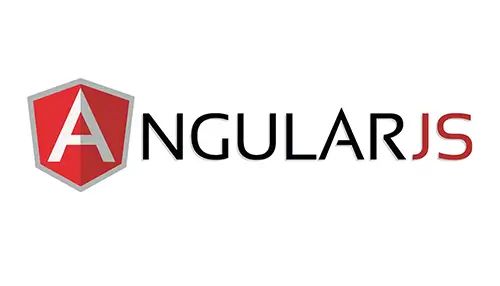Everybody wants to build an app that does not clutch your budget and offer smoother operations. With the help of AngularJS and Angular, you would be able to build such applications meant for your audience. What you need to know is that Angular is the advanced version of AngularJS. What’s the difference between Angular vs AngularJS?
For front-end developers, Angular has been and probably still is the most preferred choice of framework for building web and mobile applications. But technology has evolved radically over the years and the same is the case with front-end technologies. The three main front-end coding languages that work in conjunction to make up the Internet are HTML, CSS and JavaScript. AngularJS is a relatively new JavaScript framework backed by Google and a large community of developers and programmers.
AngularJS is a trending framework nowadays as it has wide scope for structuring exceptional single-page web apps. It is a structural platform that fundamentally expands the HTML DOM with added features and helps in forming a responsive application to the users’ acts.
Whereas, Angular versions are highly preferable as a robust front end-tool supplying components that assist a developer to write, re-write, easy-to-use, readable, and maintainable code.
Let us have a quick look at Angular vs AngularJS and their concepts.
Introduction to Angular Framework
Angular is a framework that is used for developing single-page applications using TypeScript and HTML programming languages. Angular is generally denoted as Angular 2+ or Angular v2 and beyond.
Angular2 follows core and optional functionality as a set of TypeScript libraries and utilizes numerous features of ECMAScript 6 that you may import to your applications. Its architecture depends on certain crucial scope and conceptions.
The basic building blocks in Angular 2 are NgModules, which provide a compilation structure for components and directives. These modules of Angular 2 assemble interrelated codes into a well-designed set.
In this approach, the application comprises a root module that authorizes bootstrapping and characteristically has more feature modules and improvements.
Before understanding Angular vs Angular JS, let us have a look at what Angular versions are.
Versions of Angular
Angular 1 is at the centre of the DOM compiler. We can write HTML, and the Angular compiler takes charge of assembling it into an application. Angular 2 is based on JavaScript. It is open-source to develop web applications from scratch in JavaScript and HTML.
Angular 4 is a JS framework for developing apps in HTML, JavaScript, and TypeScript, which is a superset of JS.
From the varied versions of Angular, the release of Angular 6 had the prime focus on the toolchain, making it function promptly with Angular in the ng-app update, ng add, Angular Material + CDK Components, Angular CLI (command-line interface) workspaces, animation and validations package, RxJS v6, and Angular Elements.
The version of Angular 9 is rationalized to work chiefly with TypeScript 3.6 and 3.7. It has the ability to move all the applications to employ the Ivy compiler view engine and runtime by default.
Features of Angular
- Angular develops native web applications with approaches from Ionic, Cordova, or NativeScript.
- It uses contemporary web policy and compatibility to convey app-like capabilities – offline, speed in performance, and zero-step installation.
- It has the command line tools that aid in adding tests, components and other related things, and then promptly deploys it.
- It creates UI views with powerful and simple template syntax value quickly.
- It creates a complex, high-performance animations timeline and documentation with less adoption of code through Angular’s in-built API.
Introduction to AngularJS Framework
AngularJS is an open-source JavaScript framework that is maintained by Google and a community of Angular developers to address challenges faced in forming single page web applications.
In 2009, AngularJS was initially developed by Misko Heavery and had a motive to ease the development and thereby, the testing process of these applications. AngularJS programming renders the highest simplifications and improvements to the complete development approach and constitution of JS coding.
AngularJS renders the program for model view controller (MVC) and model view-view model (MVVM) architecture, besides the components that are usually used in dynamic web technologies.
The latest version of AngularJS is 1.8.x. The framework is in long term support mode since July 2018.
It has gained immense popularity as is the front end portion of the MEAN stack, comprising Express.js app server structural programs that link dynamic MongoDB databases, Node.js server runtime environment, and Angular.js itself.
Features of AngularJS
- Controllers are JavaScript functions that are bound to a specific case and scope.
- Data binding is the programmed synchronization of the data between view and model components.
- AngularJS presents several inbuilt services to fulfil the requirements. For example, HTTP to create an XML HTTP Requests.
- Routing is a notion of transferring the views, and hence, providing solutions.
- Directives are the markers on DOM foundations like attributes, data, elements, CSS, and more. These can be utilized to make customized HTML tags that may serve as new widgets. It has inbuilt directives namely ngBind and ngModel.
- Model View Whatever (MVW) is a pattern for separating data application into dissimilar parts called model, view, and controller, each with distinctive accountabilities. It does not devise MVC architecture in traditional style, but rather is somewhat nearer to model view view model (MVVM). AngularJS team denotes it amusingly as Model View Whatever.
Vital Difference Between Angular Vs AngularJS
AngularJS uses the functions by reading the HTML page, which has added norm HTML attributes rooted into it for building user interfaces.
In contrast, the Angular framework makes it easier to develop complex web applications. It utilizes dependency injection, variable, declarative template engine, end to end tooling, and integrated best practices to answer the challenges in development.
The following table depicts the aspects of Angular vs AngularJS in detail:
| Key Features | Angular | AngularJS |
|---|---|---|
| Architecture | Angular uses components and directives. | Angular.js works on MVC (Model-View-Controller) design. |
| Language | Angular code is written in Microsoft TypeScript | AngularJS code is written in Javascript. |
| Mobile | Angular builts mobile support applications. | AngularJS code is not mobile-friendly. |
| Expression syntax | ( ) and [ ] attributes are used for two way binding between view and model. | {{ }} expressions are used for two way binding between view and model. Special methods, ng-bind can also be used to do the same. |
| Dependency Injection | A hierarchical dependency injection system is used. | Dependency injection system is not used. |
| Routing | RThe Angular team uses @RouteConfiguration {(…)} to define routing information. | AngularJS development team uses @routeProvider.when ( ),for configuration and routing information. |
| Management | Angular code has a better structure, and it is easy to create and manage large Angular applications. | AngularJS project is difficult to manage with increasing the size of the source code. |
Which One to Choose: Angular VS AngularJS?
Angular and AngularJS both come with various benefits. Google maintains both frameworks perfectly, so it holds extensive community support. Most people prefer Angular as it develops dynamic apps for both mobile and web and builds single-page apps using HTML and TypeScript.
From the article and above comparison table depicting the difference between Angular Vs AngularJS, we can observe that Angular.JS is a robust framework that is used to develop scalable client-side website applications with lesser development effort and time.
With its valuable concepts and functionalities, it gets the application to run fast and be stable. In fact, the Angular version provides several benefits to front end developers, which is the prime reason why various popular companies use Angular for their projects.
Oditek Solutions provide Angular development services for building dynamic desktop, mobile, and web applications. Contact us today with your web idea. Please reach out to us for the development of enterprise-grade application needs that require an excellent front-end user experience.







